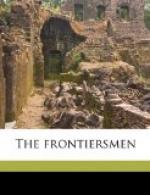Abram Varney felt his heart leap into his throat, then sink like lead; Colannah, triumphant, knowing naught of the subtler significance of the contest, joyful, aglow with pride, rose up in his splendid feathered mantle, standing high on the slope, to sign to the boy his pleasure in the victory. The sunlight fell, glittering very white, on the young fellow’s doeskin garb, his prickly belt of fangs, his bare chest with the blue warrior’s marks, the curls of his auburn scalp-lock tossing in the wind. He had seemed hitherto stoical, unmoved by victory as he would have appeared in defeat; but Varney, eager to get at him, to combat his resolution, knew that he was stunned by the complications presented by this falling out of the event. He visibly faltered as his eye met the triumph and affection expressed in Colannah’s quivering old face. He could not respond to its congratulation. He dropped on one knee suddenly, bending low, affecting to find something amiss with one of his moccasins.
Wyejah, too, could seem unmoved by victory, but indifference to defeat was more difficult to simulate. He had in the first moment of its realization felt the blood rush to his head; despite his strong nerve his hand trembled; the smile of placidity which it was a point of honor to preserve became a fixed grin. Several other young braves had come into the yard, and were idly tossing the lance at the great chungke-pole—as a billiardist of the civilized life of that day might pocket the balls with a purposeless cue after a match. Wyejah, too, had cast his lance aslant; then he idly hurled the chungke-stone with a muscular fling along the spaces of the white sand. His nerve was shaken, his aim amiss, his great strength deflected. The heavy discoidal quartz stone skimmed through the air above the stretch of sand, and striking with its beveled edge the kneeling figure on the temple, the future of the victor at chungke became in one moment the past.
The trader could only have likened the scene that ensued to the moment of an earthquake or some other stupendous convulsion of nature. In the midst of the confusion, the wild cries, the swift running figures, the surging of the crowds into the chungke-yard that obliterated the wide glare of the sun on the white sand, he made good his escape. He knew enough of the trend of Cherokee thought to be prescient of the fate of the scapegoat. Colannah in the first burst of grief he knew would blame himself that he should have tempted fate by the mystic draught from Herbert’s Spring to hold here that bright young form for seven years longer. How sadly true!—for seven years Otasite would remain, and seven to that, and, alack, seven more, and forever! Soon, however, the natural impulses of the Indian’s temper, intensified by long cultivation, would be reasserted. He would cast about for revenge, remembering the first suggestion of the departure of Otasite, and from whom it had emanated. But for the English trader and




